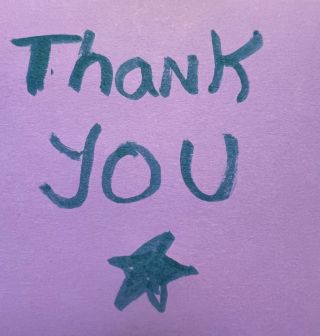Career
It's Never Too Late to Say Thank You
After decades, I finally got to thank the person who changed my life.
Posted March 6, 2024 Reviewed by Tyler Woods
Key points
- For years, it bothered me that I hadn't thanked someone who had changed my life. Finally, I got to.
- Gratitude has no time limit.
- Because a professor listened and didn't judge, I was able to hear his wisdom.

My life changed when I was 19 and a student at Brandeis University. My famous writing professor had scolded me in class, telling me I’d never make it, that I’d never have the stuff or the stamina to be a writer. At first, I cried in class (he just shoved a box of Kleenex to me while the other students sat rigid), but then I got angry. I’ll show him, I decided.
The solution seemed both obvious and tremendously romantic. I would drop out of school and go to Paris and write! I could see it all. I’d have a wonderful apartment in the heart of the city. I’d write all day, and before I knew it, I’d be famous. When I went to tell Brandeis that I was dropping out, the dean sighed and said, “Before I let you do this, you have to talk with three different professors in the department.”
Fine, I shrugged. I knew it wouldn’t change my mind.
It didn’t at first. I saw all three professors in one day, wanting nothing more than to get the meeting over with. The first professor snapped at me and said I was giving up a world-class education and an award-winning English department. Being young and clueless, I said, “Oh, so what?” That did not go over well. The second professor was more world-weary and after saying things like “You kids don’t realize what you’ve got,” he got up and huffed out.
Then came a professor I knew only by his swashbuckling cape and his reputation: Alan Levitan. He was beloved for his Shakespeare classes, where he’d read all the parts out loud so dramatically as to mesmerize everyone. He was also known for his charismatic personality and for once staying in a dorm (North B!) to see what it was like. But when he came into the classroom to talk with me, instantly the atmosphere changed.
He sat down casually and watched me with curiosity. “So, tell me...” he said gently.
The whole time I told my story, how my writing teacher had made me cry, how I didn’t feel my education was necessary, how I would make it big in Paris, he simply listened, and the more he did, the more seen I felt. When I was finished, he didn’t react the way the other professors had. Instead, he calmly began asking me questions, leaning forward, truly seeming interested in my answers. “How thrilling,” he said. “Paris is amazing. Where will you live?”
“Oh, right in the heart of the city.”
He nodded. “That’s fantastic. So, you have money saved to do this, or do you need to work?”
I must have blanched because he quickly reassured me. “Oh, you can find work as a waitress easily, I’m sure, and it will be fine living outside of Paris. You won’t mind sharing a tiny space with others, right? It’s sort of like a dorm room.”
I felt a seed of panic growing in my stomach, but he kept happily talking.
“And even though the train home might be long, you can always write, if you’re not too tired.” He nodded approvingly. “How’s your French?” he asked. “The French love it when you’re fluent.”
I hunkered down in my seat, my two years of high school French like a hand pushing me down.
“Your parents will love to visit,” he said. “And your friends!”
That’s when I first considered my parents, how proud they had been when I got into Brandeis, how they had scrimped to send me to such an expensive school.
He stayed positive and cheerful as I began to see for myself that maybe this idea of mine wouldn’t work. “You have to do what’s best for your dreams,” he told me. “I mean, really, how much time do you have to be a writer here at Brandeis?”
I thought of the long hours I wrote on the sprawling grass, of the way I could forget where I was when I was writing in the student union or in my dorm room. I often didn’t have to be up until an afternoon class. Everything felt upside down. “I think I’m going to stay,” I said quietly, and he nodded and grinned.
I stayed in school. I worked harder. I shut out the naysaying of my writing professor. I’m ashamed now to admit I never sought out Alan again. I never got to tell him how profoundly he had changed my life simply because he had listened. He had asked calm questions that pushed me to realize that “doing what was best for my dreams” was to stay in school.
Eventually, I became what I had wanted: a published writer.
But that’s not the whole story.
Over the years, I never forgot that lesson. When I was raising my son, I remembered what Alan Levitan had shown me. Don’t judge. Don’t frown. Just be there. Just listen. If you have something to say, try to say it so that whoever is speaking believes they have come to that conclusion themselves.
I always regretted not telling him how deeply he had changed my life. “No time like now,” Jeff, my husband, said, and so I set about trying to find him. I didn’t have any luck until Brandeis asked me to write about a moment of profound change and learning when I was at Brandeis.
Of course, I thought of Alan. I wrote the piece and Brandeis Magazine published it. It felt like something. But it wasn’t enough.
Until it was.
To my surprise, he contacted me! He now in his late 80s, surrounded by friends, regretting nothing (isn’t that wonderful, to regret nothing?) except that he had not more of all the things that had made him happy. He told me that being thanked—even so late after the fact—meant everything.
He invited me to have tea with him if I got to Boston. We talked about books and art and movies, and mostly I wanted to know: how did he get so...well... delightful? How had he stayed that way? That question made him laugh, and then he sent me an article written by one of his doctors about how he had calmly refused a serious operation because of the possibility of a dicey outcome, but mostly because he wanted to continue to savor all the remaining moments of his life and continue to treasure every single one of them.
With no regrets.
I cried reading the piece and then I emailed the doctor who wrote it, and to my continued astonishment, the doctor and I ended up bonding over Alan and became friends. She might even come to my book reading.
I email Alan all the time now. I get to thank him every day, not just for that life-changing moment so many years ago, but for all the moments now that he makes me laugh, engages me, and strengthens our bond. Alan has no regrets. And because of him, I now don’t either.




